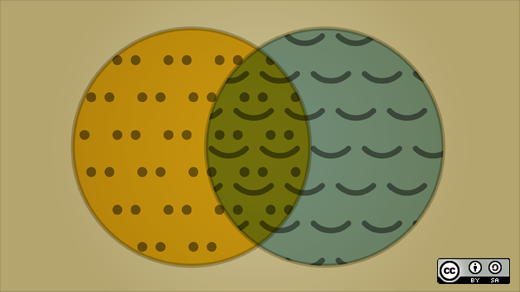Humans have always formed communities. They are necessary for support both physically and, according to psychologists, emotionally as well. Until recently, though, the development of communities was constrained by geography. If you wanted to raise a barn or have a quilting circle, for example, only the folks nearby could participate. The Internet, though, has allowed communities to grow in ways that are not bounded by geography.
In one way, that's a huge improvement because it means that input isn't limited by locality. However, while the wider range of input is good (because dialogue is good), it also increases the chances of misunderstanding—not out of ill-intent, but just because people don't carry along all the same base assumptions. Consider two cities: one might be afflicted with mudslides, the other with forest fires, and both with drought, a prolonged lack of sufficient water. When the cities interact, so to speak, they can and should focus on their common malaise: drought. However, if one city demands a solution for mudslides, the other city's concern about forest fires is left unaddressed by the community of cities. It's not that locality makes it impossible to understand that something might not apply in all cases, but adding the variable of different locations introduces another potential point of misunderstanding.
Empathy provides the crucial bridge that allows for the understanding of situations different than your own. That sense of community fosters open source because community implies inclusiveness and connectivity, two hallmarks of the open source mindset.
Martin Buber wrote "Ich und Du," translated as "I and Thou," which suggests that we, as humans, address objects in one of two ways: as an "it," an object that exists objectively, which is used or experienced, or as a "thou," or "you," in which case the object exists in the context of relationship. An "it" remains unchanged in its nature when it's interacted with. That's not to say that an "it" is permanent; we might break a cup, for example, which clearly changes the cup into something else (namely, a "broken cup"). However, we don't have to be involved with the cup for it to exist; that's the objective relationship. A "thou" exists in the context of a relationship, in the perspective of the observer.
To understand how this works, consider three aspects of a relationship:
- the observer
- the observed
- the observation
The object you're observing is seen in your context; this means that the person with whom you interact might objectively be "Mary," but to you, she might be your wife and friend. She does not exist to you without that relationship being a factor; she's a "Thou." Since a "Thou" exists with a relationship as a core aspect, it's (usually) difficult to intentionally hurt the one being observed; because the relationship is your investment in the observation, you tend to have more empathy.
Empathy can be defined as "the ability to understand and share the feelings of another." It requires that the one with whom you're empathizing be a "thou," in Buber's terms, because empathy involves the relationship. (One doesn't often think about how a coffee cup feels.) The Internet makes empathy more difficult because our interactions no longer necessarily involve immediate identification with the humanity of those with whom we interact. We don't hear their voices, or see their faces; we can't tell whether they're actually smiling when they say something, or whether the tone of voice indicates anger. We're naturally removed from each other, and we see bits of light on an unmoving screen as our sole point of reference. Emoticons can help, but not by much; they're also easily (and often) ignored because of their ubiquity. Sarcasm doesn't help, either: "You're an idiot! ;)" can be taken as a joking insult, or it might be taken as a condemnation, with a wink added to make it seem less aggressive.
Therefore, it's easy to identify others as a collection of "its" and no longer a set of "thous." Because we interact with an "it" far differently than we do with a "thou," our relationships become formal at best and actively abusive at worst; see the rash of cyberbullies littering the news, often with tragic results.
But, open source wins most often when we see each other as real people, as opposed to anonymous interactions. That requires some sense of empathy. But, empathy slows down interactions, which can seem unfortunate in Internet Time, but the result of taking the extra time is a far better sense of consensus and growth. A lack of empathy means an interaction is controlled by dictates or abuse; and, in the end, you have a schism (where the "losing" party might resent the "winner") or surrender (where the "loser" stops really participating.) It's worth pointing out that some personalities don't react like this. Like, people with Asperger's Syndrome, for one. Others disassociate themselves from online interactions (voluntarily or otherwise), accepting the coldness and lack of empathy as a result of the medium. To some degree, they're right, but this is also somewhat tragic.
The intrawebs are disassociative by nature, but it doesn't have to be this way.
Make yourself a teacher. Acquire a friend. And, judge every person favorably. —R. Yehoshua ben Perachiah
When reading (or writing) something online, take the time to ask yourself who's on the other end of the communication. What do they want to learn, or accomplish? Why do they want what they want? Do you want the same things they want? Is there a way for both of you to be satisfied? Does what you write contribute to the overall sum of knowledge?
Writing is the standard form of communication on the Internet. When you write a blog post, or a comment on a blog, or post a status update on Facebook, or a response on a mailing list... you're writing. Podcasts and videos have some different characteristics, because you do have some auditory and visual cues available, but these mediums still benefit from being thought of in the context of "I and thou." Even if the answers are negative, like "No, if you're satisfied with this solution, my needs are not met," a public understanding can allow both parties to move on with understanding and, generally, positive results. No, a given solution might not satisfy both parties, but at least the camps would understand each other, and would factor in for future considerations. It's entirely worth trying to form relationships, even cursory ones, with those with whom you interact, because not only does it help you to see them as "real people," with real needs, but it helps them see you as a real person with your own needs. This makes the world a better place.
References
- The Open Source Way, Essential terminology: Community
- Wikipedia, Community Psychology
- A simple description of Maslow's Hierarchy of Needs from Simply Psychology
- Albion.com's summary of netiquette, rules for polite behavior online
- Email etiquette: 9 best practices and things to avoid
- Harvard University's suggestions for students and faculty: Working in Groups
- Martin Buber's I and Thou, Amazon.com, 1937







Comments are closed.